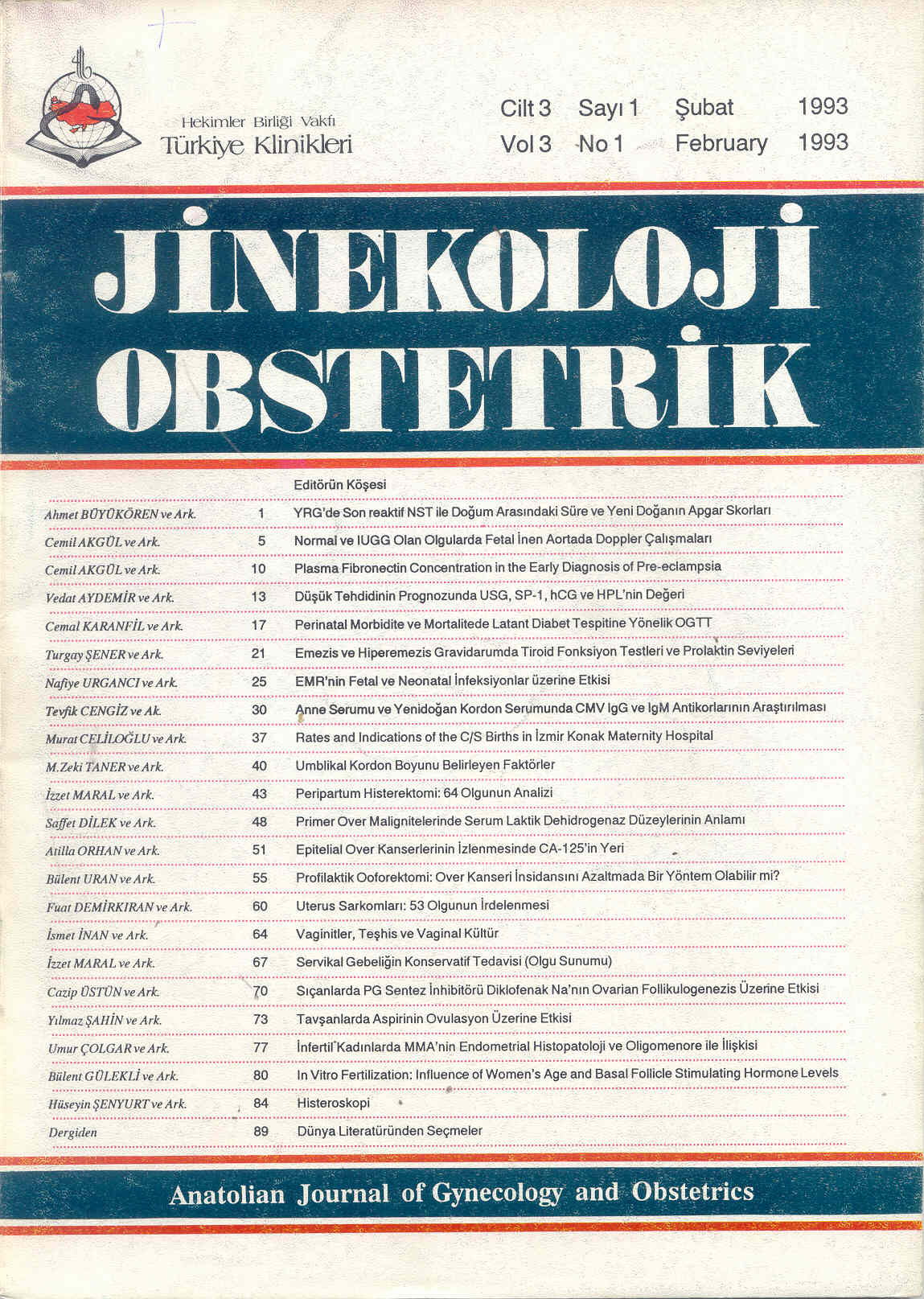Open Access
Peer Reviewed
ARTICLES
3613 Viewed2237 Downloaded
Thyroid Function Tests And Prolactin Levels In Emesis And Hyperemesis Gravidarum
Emezis ve Hiperemezis Gravidarumda Tıroid Fonksiyon Testleri ve Prolaktin Seviyeleri
Turkiye Klinikleri J Gynecol Obst. 1993;3(1):21-4
Article Language: TR
Copyright Ⓒ 2025 by Türkiye Klinikleri. This is an open access article under the CC BY-NC-ND license (http://creativecommons.org/licenses/by-nc-nd/4.0/)
ÖZET
Anadolu Üniversitesi Tıp Fakültesi Kadın Hastalıkları ve Doğum Polikliğine gebeliklerinin birinci trimestrlerinde başvuran 46 kadın tiroid fonksiyon testleri ve serum prolaktin değerleri yönünden incelendi. Bu gebelerin 12'sinde sadece bulantı (G1), 27'sinde hafif derecede bulantı ve kusma (G2) mevcut olup bu gruplardaki hastalar ayakta tedavi gördüler. Yedi hasta ağır derecede bulantı ve kusma nedeniyle (G3) klinikte yatarak tedavi gördü. Aynı gebelik haftasında olup hiçbir klinik şikayeti olmayan 12 gebe kontrol grubu (K) olarak alındı. Sadece bulantısı olan, hafif derecede bulantı ve kusması olan ve şiddetli bulantı ve kusması olan 3 hasta grubu kontrol grubu ile karşılaştırıldığında, serum Tiroidotironin (T3), Serbest Tiroksin İndeksi (FT4I), Tiroid Stimülan Hormon (TSH) ve Prolaktin (P) değerleri yönünden istatistiksel fark saptanmadı. Klinikte yatarak tedavi gören ve şiddetli bulantı ve kusması olan 7 hastanın (G3) rutin tedavi protokolü öncesi ve sonrası T3, FT4I ve TSH değerleri karşılaştırıldığında arada istatistiksel olarak anlamlı bir fark bulunamadı (p>0.05). Serum prolaktin değerlerinin ise tedavi öncesine göre anlamlı olarak arttığı gözlendi (p<0.05). Bu artışın gebelikte normalde beklenen değerlerin üzerinde olduğu görüldü.
Anadolu Üniversitesi Tıp Fakültesi Kadın Hastalıkları ve Doğum Polikliğine gebeliklerinin birinci trimestrlerinde başvuran 46 kadın tiroid fonksiyon testleri ve serum prolaktin değerleri yönünden incelendi. Bu gebelerin 12'sinde sadece bulantı (G1), 27'sinde hafif derecede bulantı ve kusma (G2) mevcut olup bu gruplardaki hastalar ayakta tedavi gördüler. Yedi hasta ağır derecede bulantı ve kusma nedeniyle (G3) klinikte yatarak tedavi gördü. Aynı gebelik haftasında olup hiçbir klinik şikayeti olmayan 12 gebe kontrol grubu (K) olarak alındı. Sadece bulantısı olan, hafif derecede bulantı ve kusması olan ve şiddetli bulantı ve kusması olan 3 hasta grubu kontrol grubu ile karşılaştırıldığında, serum Tiroidotironin (T3), Serbest Tiroksin İndeksi (FT4I), Tiroid Stimülan Hormon (TSH) ve Prolaktin (P) değerleri yönünden istatistiksel fark saptanmadı. Klinikte yatarak tedavi gören ve şiddetli bulantı ve kusması olan 7 hastanın (G3) rutin tedavi protokolü öncesi ve sonrası T3, FT4I ve TSH değerleri karşılaştırıldığında arada istatistiksel olarak anlamlı bir fark bulunamadı (p>0.05). Serum prolaktin değerlerinin ise tedavi öncesine göre anlamlı olarak arttığı gözlendi (p<0.05). Bu artışın gebelikte normalde beklenen değerlerin üzerinde olduğu görüldü.
ANAHTAR KELİMELER: Hiperemesis gravidarum, tiroid fonksiyonu testleri, prolaktin
ABSTRACT
Thyroid function tests and serum Prolactin levels of 46 pregnant women who were in the first trimester of their pregnancy were evaluated in the Gynecology and Obstetrics Department of Anadolu University, Faculty of Medicine. Twelve of these patients complained of only nausea (G1) and 27 complained of mild nausea and vomiting (G2). All of these patients were treated in out-patient clinic. Seven patients were treated in the hospital because of the severe nausea and vomiting (G3). Twelve asymptomatic pregnant women were evaluated as the control group. When all the study groups were compared with the control group, there were no statistical difference (p>0.05) in the serum Triiodothyronine (T3), Free Thyroxine Index (FT4I), Thyroid Stimulating Hormone (TSH) and Prolactin (P) levels. In the group with severe nausea and vomiting there were no statistical difference (p>0.05) in the T3, FT4I and TSH levels before and after the routine management protocol. But serum prolactin levels were significantly higher (p<0.05) after the treatment. This is beyond the expected increase during pregnancy (p<0.05).
Thyroid function tests and serum Prolactin levels of 46 pregnant women who were in the first trimester of their pregnancy were evaluated in the Gynecology and Obstetrics Department of Anadolu University, Faculty of Medicine. Twelve of these patients complained of only nausea (G1) and 27 complained of mild nausea and vomiting (G2). All of these patients were treated in out-patient clinic. Seven patients were treated in the hospital because of the severe nausea and vomiting (G3). Twelve asymptomatic pregnant women were evaluated as the control group. When all the study groups were compared with the control group, there were no statistical difference (p>0.05) in the serum Triiodothyronine (T3), Free Thyroxine Index (FT4I), Thyroid Stimulating Hormone (TSH) and Prolactin (P) levels. In the group with severe nausea and vomiting there were no statistical difference (p>0.05) in the T3, FT4I and TSH levels before and after the routine management protocol. But serum prolactin levels were significantly higher (p<0.05) after the treatment. This is beyond the expected increase during pregnancy (p<0.05).
MENU
POPULAR ARTICLES
MOST DOWNLOADED ARTICLES





This journal is licensed under a Creative Commons Attribution-NonCommercial-NoDerivatives 4.0 International License.










